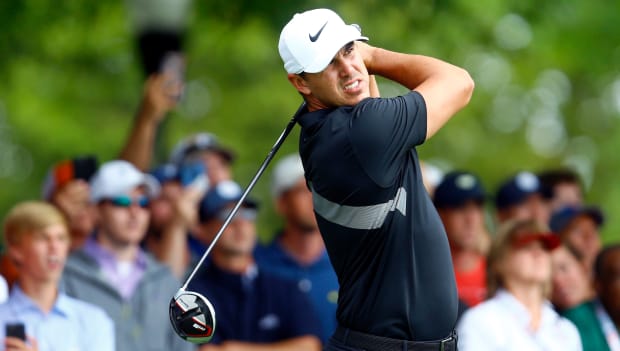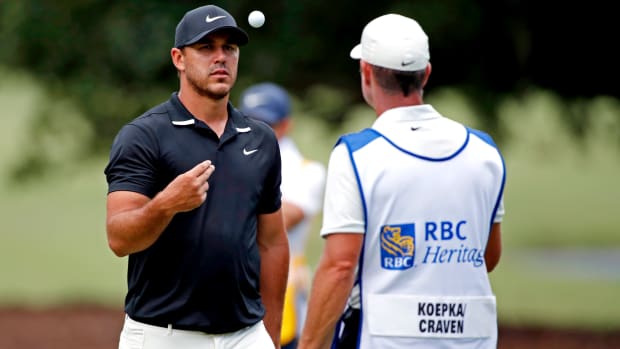Brooks Koepka is seeking his fifth major and his third straight PGA Championship. His greatest asset is his mind.
The most powerful force in golf right now is not Bryson DeChambeau’s driver or Tiger Woods’ long irons. It is the mind of Brooks Koepka. This has been a crazy year, for golf and the world and for Koepka himself, but part of Koepka’s genius is that in the biggest moments, he thinks about exactly what he should think about, and nothing more. Pandemic, knee injury, slump, rankings, a disappointing finish last week—none of these are on the list. Koepka’s brain comes equipped with the world’s most efficient eraser.
He showed up to TPC Harding Park seeking his fifth major and his third straight PGA Championship, and the only real reason to call him the favorite is that he is Brooks Koepka. That’s the only reason he needs. He shot a four-under 66. He is in contention. And whatever happens from here, let’s appreciate how hard this round should have been, and how hard it wasn’t.
Koepka has struggled for much of the PGA Tour’s restart; he is 96 in the FedEx Cup standings. Last week, at the World Golf Championship event in Memphis, Koepka stood on the 72 tee knowing he probably needed birdie to have a chance at a playoff. He took an aggressive line and dunked his drive in the water. This week he switched back to his old driver. But the bigger switch is going from a WGC event to a major.
“The majors always seem like an easier week for me,” he said, for roughly the 40 time.
Why? The easy answer is that he cares a lot more about majors, but that is reductive at best. Rory McIlroy, Justin Thomas, Jon Rahm and the rest all care more about majors. What separates Koepka these days is how he channels that passion. He manages to be more focused and calmer. He does not let bogeys become triple bogeys. He knows this is big, but he doesn’t make it too big.
“Guys tend to … not over-prepare, but practice a little too much,” Koepka said. “Mentally, I’m done after four days of this.”

Koepka has won four of the last 10 majors he entered (he missed the 2018 Masters with a wrist injury). He finished in the top 10 in four of the other six. His success is not about summoning greatness at the moment when he needs it. It is about summoning consistent, smart, poised play all week.
He is not impervious to nervousness. But he does not turn a bad hole into a bad nine, and he does not care a whit about the rest of the field. At last year’s PGA, Koepka played the first two rounds with Woods, an assignment that would have made some golfers so shaky, their shoes would fall off. Koepka said afterward that he didn’t remember a single shot Woods hit: “It doesn’t register.” He was asked Thursday about the last few holes of the back nine, and he started to answer, then admitted, “I can barely remember the holes.”
McIlroy, a four-time major champion himself, said Thursday, “The run of golf he’s played in the majors is incredible. He seems to find his comfort zone in these environments. We’re all just lucky he doesn’t find it every other week.”
Why does Koepka find his comfort zone? The answer is surely more complicated than any of us appreciate, but this is probably part of it: He does not worry about being liked. A major is a 72-hole event, just like regular PGA Tour stops. It only brings more pressure because of what it means to the rest of the world. More people are watching. They will remember what they saw. Koepka doesn’t much care what they think.
Koepka is actually quite likeable: Quick-witted, down to earth, honest, polite. He just doesn’t try too hard to impress. If you like him, you like him, not some buffed and shined version of him.
Lately, Koepka has delighted in taking shots at the beefed-up DeChambeau, who fancies himself an odd combination of Atlas and Isaac Newton. There are specific reasons for their feud, but their personalities are so different that the specific reasons might not matter. They are wired to feud with each other.
DeChambeau takes himself, and every shot, very seriously. He plays slowly. Twice in recent weeks, he asked officials for relief he did not deserve, and once he threw a little fit and took himself out of the tournament. He is a phenomenal player, but he is everything Koepka dislikes about golf. Koepka believes golf is simple to the point of being boring. DeChambeau complicates it. When Koepka smiled at the end of his press conference Thursday and said, “There is no reason to get scientific,” it sure seemed like another elbow in DeChambeau’s ribs. If Bryson objects, guess what? Koepka doesn’t care.

What seems like indifference is actually incredible mental toughness. Last year at the U.S. Open, Koepka hit an iron off a cart path on 18 and said he wasn’t worried at all about hurting his previously injured wrist. He noticed two weeks ago that he was keeping too much weight on his right foot—perhaps, subconsciously, he was trying to protect his injured left knee. But as soon as he realized it, he fixed it. He isn’t worried about the knee now, either.
“Long and straight, and he has that little fade back,” playing partner Shane Lowry said Thursday. “He’ll be hard to beat this week.”
Yes, he will be. And he knows it.